
English (961)
Children categories
BRAC launches innovation fund to make mobile money work for the poor
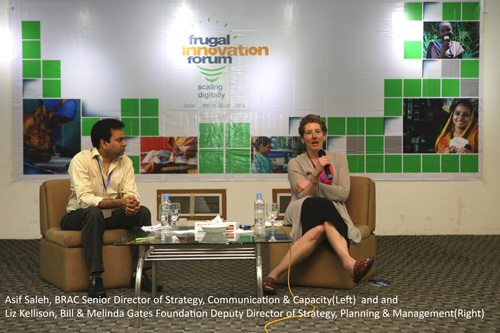
On March 30, 2014 BRAC officially launched the BRAC innovation fund for mobile money at the Frugal Innovation Forum: Scaling Digitally in Savar, Bangladesh. BRAC is experimenting with transitioning from cash and exploring new development strategies enabled by mobile money with support from the Bill & Melinda Gates Foundation.
Asif Saleh, BRAC Senior Director of Strategy, Communication and Capacity shared his thoughts, “Often NGOs lack the space to take risk and innovate. Therefore adoption of new technology can take a long time. Mobile money is an exciting new tool for financial inclusion and service delivery across many sectors, and we’re really thrilled that the Gates Foundation has given BRAC support for experimentation in this initiative. We’re seeing a lot of great ideas and look forward to beginning implementation later this year.”BRAC, the world’s largest NGO, impacts more than 120 million people in Bangladesh and works in eleven other countries. It is widely considered one of the most innovative and effective NGOs in the world, most notably for achieving success at scale.
BRAC’s Social Innovation Lab hosted an open challenge, whereby anyone could submit an idea related to how mobile money can improve the lives of the poor. Selected projects will be implemented by BRAC in Bangladesh over the course of the next year. At the Frugal Innovation Forum, over a hundred participants representing thirteen countries spent two days sharing their experiences with mobile money and data, and learning about the latest innovations emerging from the global South.
Sir Fazle Abed, BRAC founder and chairperson, BRAC’s senior director Asif Saleh and Liz Kellison, the Bill & Melinda Gates Foundation Deputy Director of Strategy, Planning and Management officially launched the fund. On the launching Sir abed said, "At my last meeting with Bill Gates, he expressed his concern about how to help poor people to save safely. That's why he supported us getting mobile money off the ground. Now I am very interested in getting new ideas through this fund and I look forward to a lot of thinking behind new ways to help the poor."
For more information about the innovation fund for mobile money, please see this link.
Community girls’ schools launched in Sierra Leone
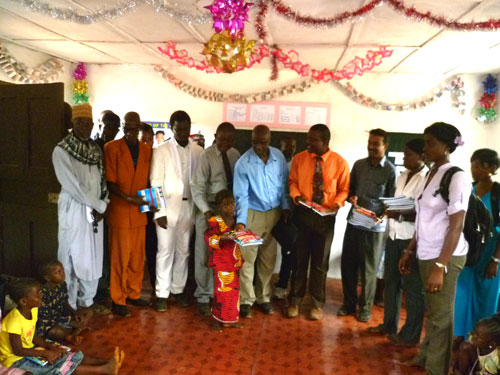
23 March 2014, Dhaka. On 17 March 2014, BRAC formally launched community girls’ schools all over Sierra Leone. Currently, one school has been opened in each of the 12 out of 14 districts that BRAC is currently working in, with the aim to open in the other two districts by 25 March 2014.
The initiative is a major component of the Girls Education Challenge project, funded by DFID. BRAC is providing education to over 7,500 girls who are marginalised and have dropped out of the formal education system. The aim is to open 250 community girls’ schools in the country.
The inaugural ceremony was attended by high officials from the Ministry of Education, various other government sectors, NGO representatives, community leaders, journalists, parents and students. The event was also covered by the country’s national television and radio station.
Perspectives on Women’s Rights: Feminist Voices from Bangladesh
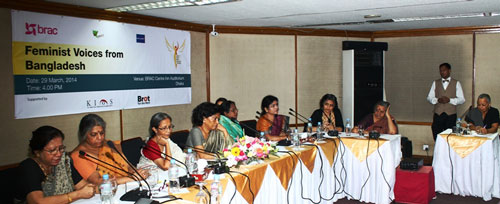
29 March 2014, Dhaka. Programme on Women’s Economic, Social and Cultural Rights (PWESCR) in partnership with South Asian Feminist Alliance (SAFA) and BRAC hosted a public event, Feminist Voices from Bangladesh on Saturday, 29 March, 2014, from 4 to 6 p.m at the BRAC Centre Inn Auditorium, 75 Mohakhali, Dhaka, Bangladesh. Eminent feminists Rokeya Kabir, Salma Khan, Khushi Kabir, Sara Hossain, Farida Akhter, Shireen Huq, Anna Minj and Moni Rani Das shared their perspectives on feminism, their personal journey as a woman’s rights leader and challenges in being part of a movement. The discussion was moderated by Barbara Phillips, who is a Board Member, PWESCR, a lawyer and civil rights activist.
In an engaging afternoon discussion, panellists self-critically examined the trends in the women’s movement in Bangladesh. Khushi Kabir shared the discomfort, especially within political circles, to use the word ‘feminist’, which is considered a ‘western’ import and not home-grown. Shireen Huq highlighted the silences within the women’s movement, particularly with regard to sexuality rights and personal freedoms. These freedoms are marginalised in favour of socio-economic rights, which the ‘comrades’ in the women’s movement have been openly debating. However, sexuality campaigns like My Body, My Decision (1994), faced resistance from even within the women’s movements. “We can say yes to equal wages but not discuss our bodies. This is when you realise comrades are not progressive after all,” noted Shireen Huq. Rokeya Kabir asserted that violence against women is most severe in the domestic realm, both natal and marital. She importantly reminded the forum that women’s rights were gravely violated during the 1971 liberation war and neither the family, relatives, religion nor the state could protect the bodily dignity of women. She recalled the challenges she faced in her life, especially the incident, in which a Senior Minister not only blamed NGOs for destroying Bangladeshi culture. “We are still fighting this battle today,” she declared. Farida Akhtar lauded the rich history of women’s movement in Bangladesh and applauded the efforts of Bangladeshi women to have always striven on their own initiative, even without the aid of the NGOs. This belief shared by Farida Akhtar was nuanced further by Moni Rani Das, Founder of Dalit Women’s Forum, who has struggled for decades to mobilise, organise, sensitise and create livelihood opportunities for Dalit women, who face multiple discrimination. With the endeavour of the Dalit Forum, Dalit women and girls are more conscious of their rights, are breaking their caste mindsets and thinking about occupations other than sweeping work.
This event was part of PWESCR’s 4th Leadership Institute in Women’s Economic, Social and Cultural Rights from 24th to March 30th 2014, in Dhaka, Bangladesh. 31 women’s rights leaders (women and men) from 18 countries working in organisations worldwide participated. The Institute, based on the International Convenant of Economic, Social and Cultural Rights (ICESCR) is held in two phases each year. 2014’s second phase will take place from 15th to September 20th in Colombo, Sri Lanka.
PWESCR is an international human rights organisation based in the Global South committed to promote women’s human rights - especially in the context of economic, social and cultural rights - by engendering policy, law and practice at local, national, regional and international levels.
Sir Fazle Hasan Abed named one of the world’s 50 greatest leaders by Fortune magazine

The US-based Fortune magazine has named BRAC founder and chairperson Sir Fazle Hasan Abed in its list of the world’s 50 greatest leaders. The list, which features leaders from politics and religion to corporate CEOs and heads of civil society organizations, features the BRAC founder at number 32.
The top five positions on the list are held by Pope Francis, German Chancellor Angela Merkel, Ford Motor Co. CEO Alan Mulally, US investor Warren Buffet and former US President Bill Clinton. Other notable persons on the list include Aung San Suu Kyi, Bono, the Dalai Lama, Angelina Jolie and Malala Yousafzai. Sir Fazle Hasan Abed is the only Bangladeshi to have made the list.
Fortune magazine is best known for publishing the annual Fortune 500 list, which ranks the largest US companies on the basis of gross revenues.
For more details please go to: http://money.cnn.com/gallery/leadership/2014/03/20/worlds-best-leaders.fortune/index.html
BRAC gives media awards to 24 journalists and three media houses
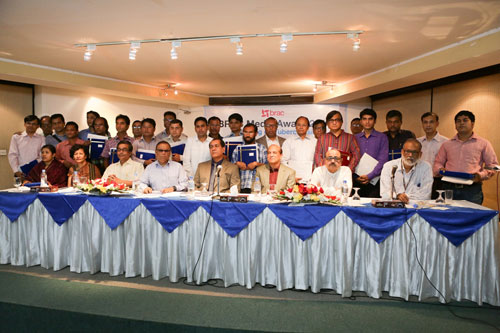
24 March 2014, Dhaka. In recognition of mass media’s valuable contribution to raising awareness about tuberculosis and its treatment, BRAC held the Media Award on Tuberculosis 2014 on Monday, 24 March, which is also International Tuberculosis Day. Twenty-four journalists from national and local newspapers and three media houses received this award for their outstanding efforts in covering the issue at the event held at BRAC Centre, Dhaka.]
Joint editor of the Daily Samakal Rashid-un-nabi Babu, deputy editor of Financial Express Shamsul Haque Zahid and Shykh Siraj from Channel I received the awards on behalf of their media houses. The jury board selected the awardees based on the reporting on TB and its treatment in 2013. Associate Director of BRAC health, nutrition and population programme Dr Md Akramul Islam announced the names of the awardees at the event. Directorate General of Health Services (DGHS), Ministry of Health and Family Welfare Prof Dr Deen Muhammad Nurul Haque was present as chief guest. Line director of the National TB Control Programme, Dr Mohammad Ashaque Husain and Senior Vice President of the National Anti-Tuberculosis Association of Bangladesh (NATAB), Mr Mozaffar Hossain Poltu and Former Bureau Chief of Associated Press Bangladesh, Farid Hossain were present as special guests. BRAC’s vice chairperson Dr A Mushtaque R Chowdhury chaired the event.
In her welcome speech, Dr Kaosar Afsana mentioned that, “BRAC initiated this award in 2008 to recognise the outstanding effort that is put together by our national and local level journalists.” Praising BRAC’s effort, jury member Farid Hossain said, “This reward has played an instrumental role in improving TB reporting in Bangladesh.” Chief guest Dr Deen Muhammad Nurul Haque in his speech praised the role of journalists and also acknowledged BRAC’s effort. Special guest Mozaffar Hossain Poltu mentioned that, “There are more than 800 DOTS centres in the country and a joint effort of 44 organisations.” He also said, “This partnership can work as a model for other countries.”
While expressing his feelings after receiving an award, Shykh Siraj said, “Every TV channel should allot a specific time for this type of news.”
Thanking everyone, BRAC’s vice chairperson closed the ceremony.
BRAC USA announces renewed push for Bangladesh garment workers
$5 million raised for newly launched Bangladesh Humanitarian Fund for rehabilitation of garment workers, victim support, and awareness of workplace safety

Donate directly to the Bangladesh Humanitarian Fund
NEW YORK, NY – As the one-year anniversary of the Bangladesh Rana Plaza building collapse approaches, BRAC USA, the North American affiliate of BRAC, announced today a multi-year fundraising initiative to ensure that progress continues on humanitarian aid and support for workers in Bangladesh’s ready-made garment industry. An antipoverty organization founded in 1972, BRAC (formerly Bangladesh Rural Advancement Committee) is a global leader in providing opportunity for the world’s poor.
BRAC USA’s new Bangladesh Humanitarian Fund will be directed to three specific program areas: support for the Rana Plaza Donors Trust Fund; continued support for BRAC’s work to provide counseling and rehabilitation to garment workers; and a reserve that can be used to support a “social safety net” for workers impacted by other tragedies such as the Tazreen factory fire in 2012.
“Bangladesh has seen significant gains in living standards, halving poverty rates in the last 20 years, thanks largely to women’s empowerment. The garment industry has played a tremendous role in this,” says Sir Fazle Hasan Abed, Founder and Chairperson of BRAC. “But these gains will mean little if we allow tragedies like Rana Plaza to continue. The words ‘Made in Bangladesh’ should be a mark of pride, not shame.”
In the wake of the collapse of Rana Plaza on April 24, 2013, which killed more than 1,100 people, BRAC has provided relief and medical assistance, psychosocial counseling for victims, and livelihood support and training with support from BRAC USA, the International Labor Organization and others. Working with other stakeholders, BRAC has also advocated for a long-term solution to Bangladesh worker safety issues.
The Bangladesh Humanitarian Fund continues that work with its first major grant this week: a $2.2 million donation to the Rana Plaza Donors Trust Fund, which supports victims of the Rana Plaza disaster and their families, who are receiving payments coordinated under a single approach through the Rana Plaza Arrangement. With the International Labor Organization serving as neutral chair, the Rana Plaza Arrangement is overseen by a Coordination Committee established in November 2013 by a multi-stakeholder coalition of government, employers, workers, retailers and civil society. BRAC USA’s Bangladesh Humanitarian Fund seeks to address victim needs and garment worker safety concerns in part by contributing a portion of every gift to the Rana Plaza Donors Trust Fund.
BRAC USA’s Bangladesh Humanitarian Fund has already raised more than $5 million, including support from Walmart, Asda, Walmart Foundation, The Children’s Place and The Gap Foundation.
“These global industry leaders and foundations contributed to BRAC USA’s fund based on BRAC’s deep history and community roots in Bangladesh, and on BRAC USA's strong commitment to a long-term solution and its high standards in grantmaking, monitoring and reporting,” said Susan Davis, President and CEO of BRAC USA.
“The Rana Plaza tragedy was a wake-up call for the world that shocked our collective conscience,” Davis adds. “Even eleven months after Rana Plaza, more support needs to be provided to victims and their families. Delays have taken place for a variety of reasons, but rather than looking back, we’re moving forward on common ground, and with a clear message: A better path is possible, and we can help create it.”
Mr. Gilbert Houngbo, the ILO Deputy Director-General for Partnerships and Field Operations, said, “The Coordination Committee has called for donations from any party, and they are very much needed to ensure fair treatment for the Rana Plaza victims who are struggling to rebuild their lives and those of their dependents and families. This coordinated Arrangement is a key step on the road to establishing decent work and safe workplaces in the Bangladesh garment industry. We welcome BRAC USA’s efforts in support of the Arrangement and hope that its pro-active approach inspires others to donate funds too.”
The Rana Plaza Donors Trust Fund is open to donors from around the world on a voluntary basis, including those that were not in Rana Plaza, as an expression of solidarity and compassion.
BRAC USA will also use contributions to its Bangladesh Humanitarian Fund to make grants in support of BRAC’s continuing work to build sustainable futures beyond monetary compensation for affected garment workers. This support includes counseling and training in new livelihoods for those who survived Rana Plaza, Tazreen and similar disasters but cannot, or do not wish to, return to the ready-made garment industry.
BRAC is the world’s largest nonprofit antipoverty organization and often among the top ranked in terms of effectiveness. A sister organization, BRAC International, now works in 10 other countries in Asia and Africa, supported by two independent affiliates headquartered in New York and London.
Since the Rana Plaza disaster, it has been working with other stakeholders in the public, private and civil society sectors for long-term solutions to Bangladesh worker safety issues. In April, BRAC University, a full-fledged institution of higher learning set up by BRAC in 2001, will host a conference on workers' rights and safety issues in Dhaka.
BRAC USA welcomes additional contributions from individuals, corporations and foundations. All gifts to the new Humanitarian Fund will be administered by BRAC USA, an independent 501(c) 3 charitable organization registered in New York State, with fiduciary responsibility resting with its board of directors.
‘Impact assessment of credit programme for tenant farmers’ workshop
16 March 2014, Dhaka. Based on the findings of the impact assessment of the credit programme for tenant farmers, a national level workshop was held on Saturday, 15 March 2014 at the BRAC centre auditorium.
Since its establishment in December 2009, the tenant farmer development project – funded by Bangladesh Bank – provides credit and other support for tenant farmers.
The event was attended by the governor of Bangladesh Bank, Dr Atiur Rahman, as the chief guest and chaired by Dr Mahabub Hossain, advisor to BRAC’s executive director.
During the workshop, professor Abul Bayes of Jahangirnagar University presented a paper on tenant farmers’ access to credit and extension services and BRAC’s borgachashi unnayan prakalpa. Dr Mohammad Abdul Malek of BRAC’s research and evaluation division (RED) presented a paper on the impact assessment of credit programmes for tenant farmers and the baseline study findings. Mr Abu Ahasan Mishu from RED also presented a paper on tenancy, agricultural livelihoods and microcredit.
Professor MA Sattar Mandal of Bangladesh’s Agricultural University pointed out that the dependence on non-institutional sources of funds (ie, friends, relatives) have decreased, while borrowing loans from NGOs has increased.
Stating that this is the “only project in the world customised for sharecroppers,” Dr Atiur Rahman mentioned, “There has been a huge shift in tenancy. Connectivity has increased.”
He also said that, “[About BDT 70 million] has been disbursed [in loans] and 700,000 tenant croppers have benefited from this project. [Additionally], 55 per cent of clients are now women.”
BRAC Driving School starts driving training course for Bangladesh Police Officials
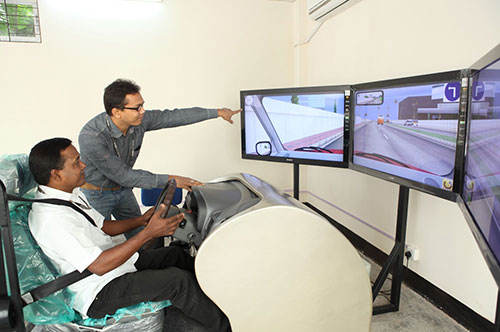
23 February 2014, Dhaka.
BRAC Road Safety Programme has started a Basic Driving Training course for 20 constables and sub-inspectors of Bangladesh Police from 23 February, 2014 at BRAC Driving School, Uttara. The aim of the 33 days training programme is to provide basic driving training for promoting safe driving practises among the novice drivers. The BRAC Driving School, established in May 2012 conducts a variety of driving courses such as driver instructors, professional women drivers, Surakkha-road safety & defensive driving training for in-service bus and truck drivers etc. through the use of digitised bar coded training manual, driving simulator, visual impairment system and P-drive system etc.
Aarong chief receives international women’s leadership award
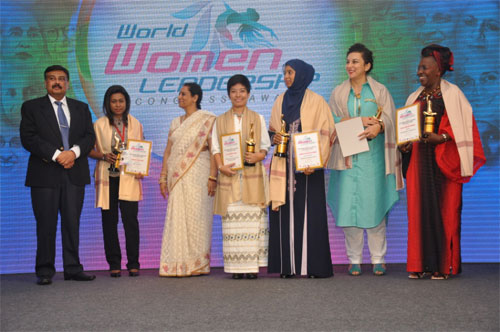
25 February 2014, Dhaka. Tamara Hasan Abed, senior director of BRAC Enterprises, was honoured with the Outstanding Women Leadership Award by the World Women Leadership Congress on 14 February in Mumbai, India.
“I am truly privileged to receive this award and to be considered among successful women leaders. I would like to accept this on behalf of the many women who have influenced my life, particularly those in my country of Bangladesh. Women are on a remarkable journey towards equality, marked with struggles and victories. This award is symbolic of yet another victory and I hope it will inspire more girls to lead,” said Ms Abed, who is head of the leading retail chain Aarong.
Women leaders from across the world attended the two-day conference, including the former minister of women’s affairs for Afghanistan, Dr Sima Samar, the president and CEO of UN Women Canada, Almas Jiwani and the managing director of HBO Asia, Monica Tata. Ms Abed, who is the daughter of BRAC’s founder Sir Fazle Hasan Abed, also spoke on a panel discussion about the opportunities and challenges facing women leaders.
BRAC’s Intervention in increasing resilience of agriculture and aquaculture systems in the south
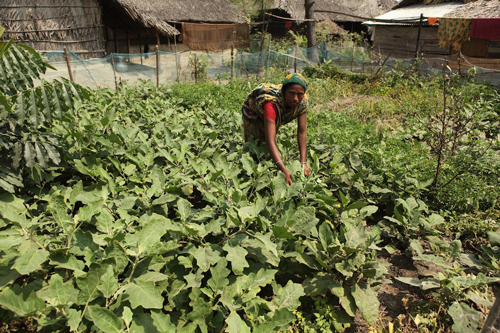
19 February 2014, Dhaka. Cultivation of rice, jute, sunflower, tomato should be increased to face the climate change affects in Bangladesh. Lack of sustainable process to reduce salinity in the water is one of the major challenges here, agro-experts suggested in the workshop held on Tuesday 18 February at BRAC Centre Inn. They also mentioned, that attention is needed in increasing the production as well as creating a market for the harvested crops.
In the keynote presentation, the programme Head of BRAC’s agriculture and food security programme (AFSP) Dr. Md. Sirajul Islam stressed on expanding the climate change adaptive technology amongst the farmers of our country.
Md Abu Hanif Miah, Director General, Department of Agricultural Extension (DAE), Ministry of Agriculture, Government of the People's Republic of Bangladesh and Kamal Uddin, Executive Chairman of Bangladesh Agricultural Research Council (BARC) were present as special guests at the event. Mr. Anwar Faruque, Director General, Seed Wing and Additional Secretary, Ministry of Agriculture, Government of the People's Republic of Bangladesh was the chief guest of the event. BRAC’s senior director Babar Kabir chaired the event and programme head of Communications and Advocacy for Social Change, Snigdha Ali gave the welcome speech.
Join the world’s biggest family




